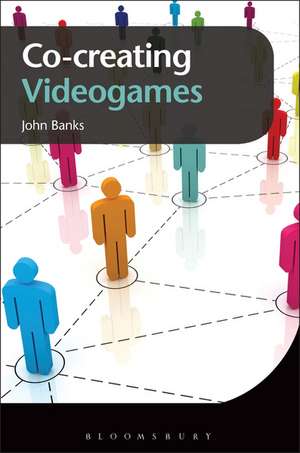Co-creating Videogames
Autor Dr. John Banksen Limba Engleză Paperback – 16 dec 2015
| Toate formatele și edițiile | Preț | Express |
|---|---|---|
| Paperback (1) | 255.94 lei 6-8 săpt. | |
| Bloomsbury Publishing – 16 dec 2015 | 255.94 lei 6-8 săpt. | |
| Hardback (1) | 497.06 lei 6-8 săpt. | |
| Bloomsbury Publishing – 22 mai 2013 | 497.06 lei 6-8 săpt. |
Preț: 255.94 lei
Preț vechi: 294.58 lei
-13% Nou
Puncte Express: 384
Preț estimativ în valută:
48.97€ • 51.27$ • 40.52£
48.97€ • 51.27$ • 40.52£
Carte tipărită la comandă
Livrare economică 05-19 aprilie
Preluare comenzi: 021 569.72.76
Specificații
ISBN-13: 9781474268424
ISBN-10: 1474268420
Pagini: 200
Dimensiuni: 156 x 234 x 11 mm
Greutate: 0.29 kg
Editura: Bloomsbury Publishing
Colecția Bloomsbury Academic
Locul publicării:London, United Kingdom
ISBN-10: 1474268420
Pagini: 200
Dimensiuni: 156 x 234 x 11 mm
Greutate: 0.29 kg
Editura: Bloomsbury Publishing
Colecția Bloomsbury Academic
Locul publicării:London, United Kingdom
Caracteristici
Examines how technologies such as game engines and software tools reconfigure relations between developers and gamers.
Notă biografică
Dr John Banks is a senior lecturer (Head of Postgraduate Coursework Studies) and researcher in the Creative Industries faculty, Queensland University of Technology, Australia. He researches and publishes on co-creativity, innovation and social media in the creative industries, especially videogames and interactive entertainment. He has a special interest in organisational and workplace culture. His past decade of research on the topic of co-creativity in the videogames industry includes his recent publication Key Concepts in Creative Industries (2012) with John Hartley, Jason Potts, Stuart Cunningham, Terry Flew and Michael Keane.
Cuprins
Introduction: Co-creating matters1. Situating Co-creativity2. Co-creative Technologies3. Co-creating Trainz4. Co-creative Labour? (with Sal Humphreys)5. Co-creative Expertise6. Modeling Co-creativity: A Co-evolutionary approach (with Jason Potts)Conclusion: Crafting Co-creative Culture (in Conversation with Will Wright)NotesBibliographyIndex
Recenzii
In the realm of game scholarship, John Banks' Co-Creating Videogames is that rare combination of significant access to the sites of videogame production and astute analysis that resists easy answers. His account of co-creative digital production shows how creativity, uncertainty, and value combine in the new economies (in the broad sense) that videogames have ushered onto the cultural landscape. A crucial contribution is his willingness to recognize the top-down elements of contrivance and design that inevitably shape the seemingly 'bottom-up' dynamics of digital cultural production. This book belongs on the bookshelf of anyone interested or invested in cultural production in the digital age.
John Banks' Co-creating Videogames provides a thorough and nuanced theory of production in the maturing Web 2.0 era. Based on original ethnographic research, Banks convincingly shows how video production these days is the outcome of an evolutionary process between economic and cultural, commercial and non-commercial factors. A far cry from the bifurcated theories in the early years of Web 2.0 culture, Banks' model is neither a euphoric celebration nor an ideological detraction, but a balanced academic study of how various actors are simultaneously shaping co-creativity. It's a must read for every scholar and student specializing in games and digital culture.
This book is a must read for anyone interested co-creative culture, one of the most important aspects of gaming and network life. Banks' nuanced and insightful treatment of the emerging relations between players and developers as they jointly produce our gaming spaces is an incredibly valuable contribution. Drawing on his rich ethnographic work, he pushes beyond simplistic models and takes us into the heart of fan practices, development processes, and new forms of creative production.
This well-researched informative volume provides readers with an explanation and analysis of the relatively new phenomenon of user-generated content integrated into professional video game development. Banks (Queensland Univ. of Technology, Australia) describes an individual case study (Trainz) in great detail, offers more general perspectives of other companies and other games, and outlines the overall issues and problems with this practice. These include determining how player-developers can be recognized and renumerated for their contributions to a game and the difficulties of integrating relationships with large groups of external content creators with a core professional development team. Other sections of the book explore current academic and philosophical research in game theory and co-creation. The content is supported by citations from player-developers, descriptions of meetings that the author attended in person, and insights from industry professionals that validate and explicate the author's points. Summing Up: Recommended. Upper-division undergraduates, graduate students, and researchers/faculty.
John Banks' Co-creating Videogames provides a thorough and nuanced theory of production in the maturing Web 2.0 era. Based on original ethnographic research, Banks convincingly shows how video production these days is the outcome of an evolutionary process between economic and cultural, commercial and non-commercial factors. A far cry from the bifurcated theories in the early years of Web 2.0 culture, Banks' model is neither a euphoric celebration nor an ideological detraction, but a balanced academic study of how various actors are simultaneously shaping co-creativity. It's a must read for every scholar and student specializing in games and digital culture.
This book is a must read for anyone interested co-creative culture, one of the most important aspects of gaming and network life. Banks' nuanced and insightful treatment of the emerging relations between players and developers as they jointly produce our gaming spaces is an incredibly valuable contribution. Drawing on his rich ethnographic work, he pushes beyond simplistic models and takes us into the heart of fan practices, development processes, and new forms of creative production.
This well-researched informative volume provides readers with an explanation and analysis of the relatively new phenomenon of user-generated content integrated into professional video game development. Banks (Queensland Univ. of Technology, Australia) describes an individual case study (Trainz) in great detail, offers more general perspectives of other companies and other games, and outlines the overall issues and problems with this practice. These include determining how player-developers can be recognized and renumerated for their contributions to a game and the difficulties of integrating relationships with large groups of external content creators with a core professional development team. Other sections of the book explore current academic and philosophical research in game theory and co-creation. The content is supported by citations from player-developers, descriptions of meetings that the author attended in person, and insights from industry professionals that validate and explicate the author's points. Summing Up: Recommended. Upper-division undergraduates, graduate students, and researchers/faculty.
Descriere
This book draws from, and is supported by, a decade of ethnographic research undertaken with videogames development companies located in Australia and the USA. It explores key contemporary issues in participatory media culture, including questions of technology, labour and professional expertise.














